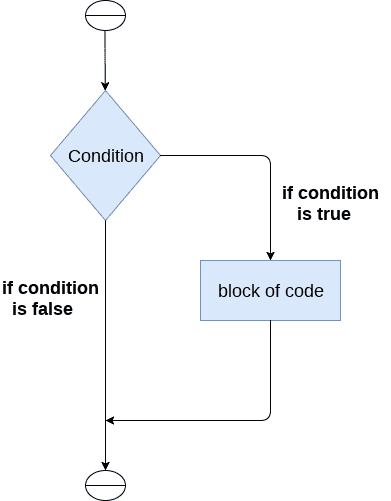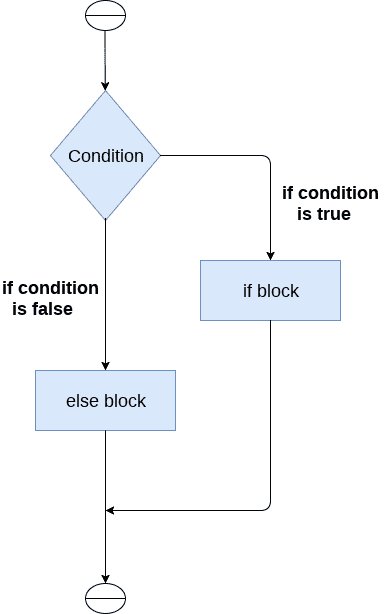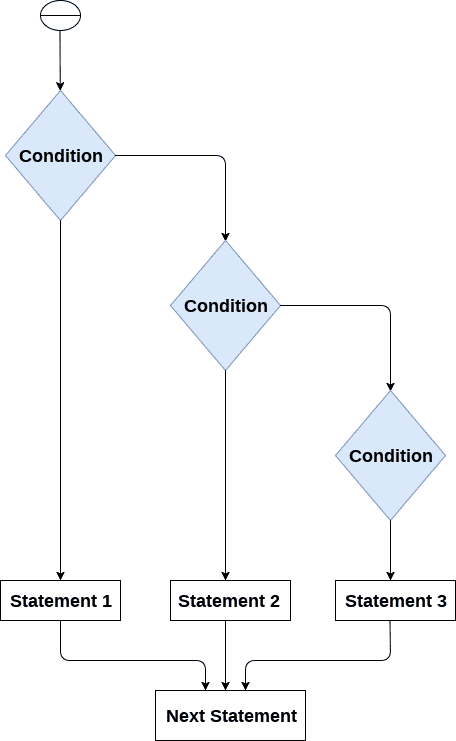Python `If-else`语句
Python If-else语句
决策是几乎所有编程语言中最重要的方面。顾名思义,决策允许我们为特定的决策运行特定的代码块。在这里,决策是根据特定条件的有效性做出的。条件检查是决策的支柱。
在 python 中,决策由以下语句执行。
| 声明 | 描述 |
|---|---|
| if 语句 | if语句用于测试特定条件。如果条件为真,将执行一个代码块(if-block)。 |
| If - else 语句 | If-else语句类似于 if语句,除了它还为要检查的条件的 false 情况提供代码块。如果 if语句中提供的条件为 false,则将执行 else 语句。 |
嵌套 if语句 | 嵌套的 if语句使我们能够使用 if。外部 if语句中的 else 语句。 |
Python 中的缩进
为了便于编程和实现简单性,python 不允许在块级代码中使用括号。在 Python 中,缩进用于声明一个块。如果两个语句处于相同的缩进级别,那么它们就是同一个块的一部分。
一般来说,四个空格用来缩进语句,这是 python 中典型的缩进量。
缩进是 python 语言中最常用的部分,因为它声明了代码块。一个块的所有语句都位于同一缩进级别。我们将在 python 中看到实际的缩进是如何在决策和其他事情中发生的。
if语句
if语句用于测试特定条件,如果条件为真,它将执行一个称为 if-block 的代码块。if语句的条件可以是任何有效的逻辑表达式,可以计算为真或假。

if语句的语法如下。
if expression: |
例 1
num = int(input("enter the number?")) |
输出:
enter the number?10 |
示例 2:打印三个数字中最大的一个的程序。
a = int(input("Enter a? ")); |
输出:
Enter a? 100 |
If-else语句
If-else语句提供了一个与 if语句相结合的 else 块,它在条件为 false 的情况下执行。
如果条件为真,则执行 If 块。否则,执行 else 块。

If-else语句的语法如下。
if condition: |
例 1:检查一个人是否有资格投票的程序。
age = int (input("Enter your age? ")) |
输出:
Enter your age? 90 |
例 2:检查一个数是否为偶数的程序。
num = int(input("enter the number?")) |
输出:
enter the number?10 |
elif 声明
elif语句使我们能够检查多个条件,并根据其中的真实条件执行特定的语句块。根据我们的需要,我们的程序中可以有任意数量的 elif语句。但是,使用 elif 是可选的。
elif语句的工作方式类似于 c 语言中的 if-else-if 梯形语句。它必须由 if语句继承。
elif语句的语法如下。
if expression 1: |

例 1
number = int(input("Enter the number?")) |
输出:
Enter the number?15 |
例 2
marks = int(input("Enter the marks? ")) |
评论













